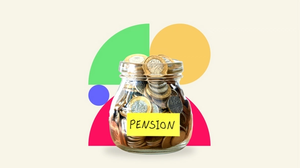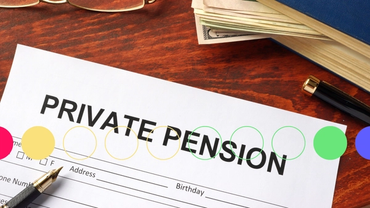Six ways to divide your pension after divorce
By Boring Money
16 Sep, 2024
According to the Financial Conduct Authority (FCA), by the time we reach retirement age, the average UK pension pot sits at just under £62,000. And it can be much more - sometimes they're worth as much as the family home. So when it comes to divorce, pensions can be one of the most important assets to consider when you're dividing things up.

In the UK, approximately 42% of marriages end in divorce. In 2022, there were 80,057 divorces granted in England and Wales alone. Depressing as it is, marital breakdowns are increasingly common and the unraveling of joint assets can be an emotional and complex task. However, just 7% of divorcees said they would seek financial advice, according to new research from Legal and General. This was despite 40% saying they believe the process is financially unfair.
On the whole, most people keep their retirement funds on a dusty shelf at the back of their mind. Years go by and they get forgotten until - suddenly - we need to rely on them. This means pensions are often overlooked in divorce settlements. We’re too caught up in the fiasco of the here and now - everything we feel, see, want, and need - to think decades into the future.
Despite this, when it comes to divorce, looking at your pensions is obviously key. So how are pensions divided when you get divorced? If you've been raising the kids, can you claim your ex-partner's pension? And will they be able to claim any of yours?
There are all sorts of complex questions around pensions which can crop up during the divorce process (as if it wasn't difficult enough!). Here we explain how pensions are typically divided during divorce, six different ways you could do it, and answer some of your top pension and divorce questions.
How are pensions divided after divorce?
Generally speaking, if you were to take your divorce to court and ask them to make a 'financial order' - that is, to decide how to split your assets on your behalf - they wouldn’t necessarily chop the pensions straight down the middle and give you half each.
Courts aim for a “fair and equitable” settlement, so they take into account a number of factors which can impact how much of you and your ex-partner's pensions are split (or kept). Here's some examples of things that can affect how your pensions may be divided when you get divorced:
The total value of your pension (i.e. your workplace and/or private pension*)
Where in the UK you're applying for divorce
Dependent children and who they live with
How long you were married for
How much of the pension was built up before the marriage
How you and your ex each “contributed” to a marriage, including bringing up children
Whether you have enough working years left to rebuild your financial position
*Your basic State Pension is not affected by divorce if you reach State Pension age after 6 April 2016. More on this below. You can read more about the State Pension in our guide here.
Every divorce is different, so if you do go to court, they will look at you and your ex-partner's unique financial situation. For example, sometimes the court decides not to divide the pensions at all if both parties have sufficient pensions of their own. Here's a breakdown of how the three types of pension - State, workplace and private - are typically treated during divorce.






